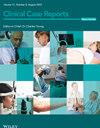在胎儿存活年龄为 28 周的国家,尽管挑战重重,极早产新生儿仍能存活的启示
IF 0.6
Q3 MEDICINE, GENERAL & INTERNAL
引用次数: 0
摘要
管理极低出生体重的极早产儿是一项挑战,特别是在加纳,生存能力设定为28周。本病例突出了低资源环境下新生儿护理的复杂性,并强调了改善卫生系统以修改生存年龄的必要性。本文章由计算机程序翻译,如有差异,请以英文原文为准。

Lessons From the Survival of an Extremely Preterm Neonate Despite Challenges in a Country Where Gestational Age of Viability Is 28 Weeks
Managing extremely preterm neonates with very low birth weight is challenging, especially in Ghana where viability is set at 28 weeks. This case highlights the complexities of neonatal care in low-resource settings and emphasizes the need for improvement in health systems to revise the age of viability.
求助全文
通过发布文献求助,成功后即可免费获取论文全文。
去求助
来源期刊

Clinical Case Reports
MEDICINE, GENERAL & INTERNAL-
自引率
14.30%
发文量
1268
审稿时长
13 weeks
期刊介绍:
Clinical Case Reports is different from other case report journals. Our aim is to directly improve global health and increase clinical understanding using case reports to convey important best practice information. We welcome case reports from all areas of Medicine, Nursing, Dentistry, and Veterinary Science and may include: -Any clinical case or procedure which illustrates an important best practice teaching message -Any clinical case or procedure which illustrates the appropriate use of an important clinical guideline or systematic review. As well as: -The management of novel or very uncommon diseases -A common disease presenting in an uncommon way -An uncommon disease masquerading as something more common -Cases which expand understanding of disease pathogenesis -Cases where the teaching point is based on an error -Cases which allow us to re-think established medical lore -Unreported adverse effects of interventions (drug, procedural, or other).
 求助内容:
求助内容: 应助结果提醒方式:
应助结果提醒方式:


